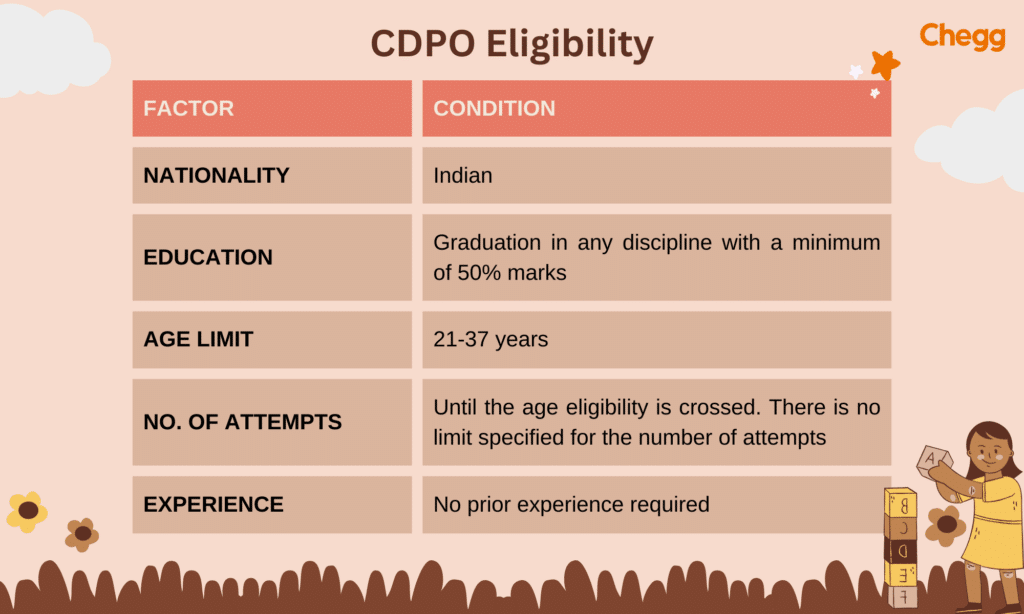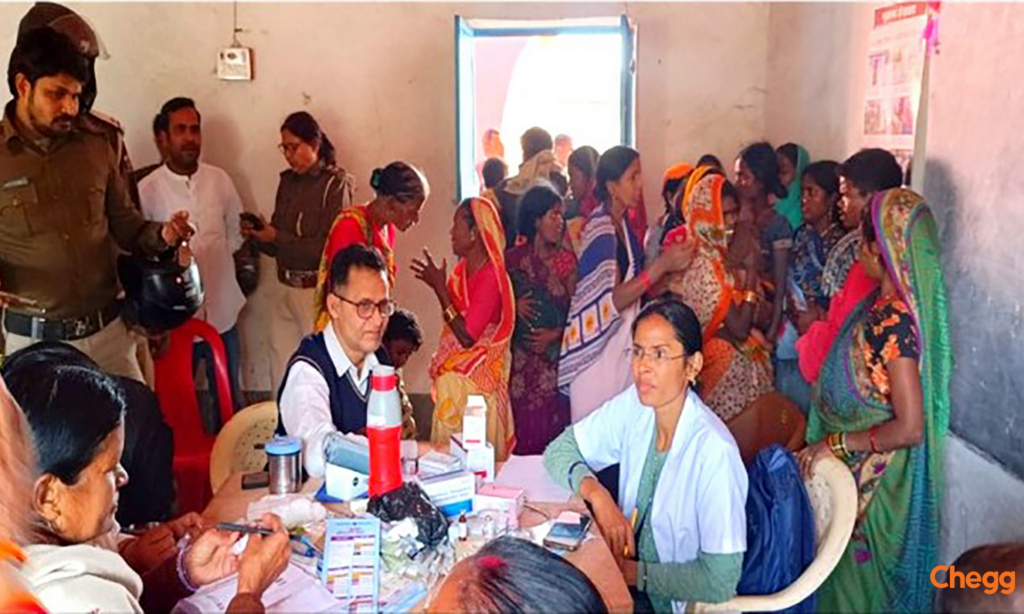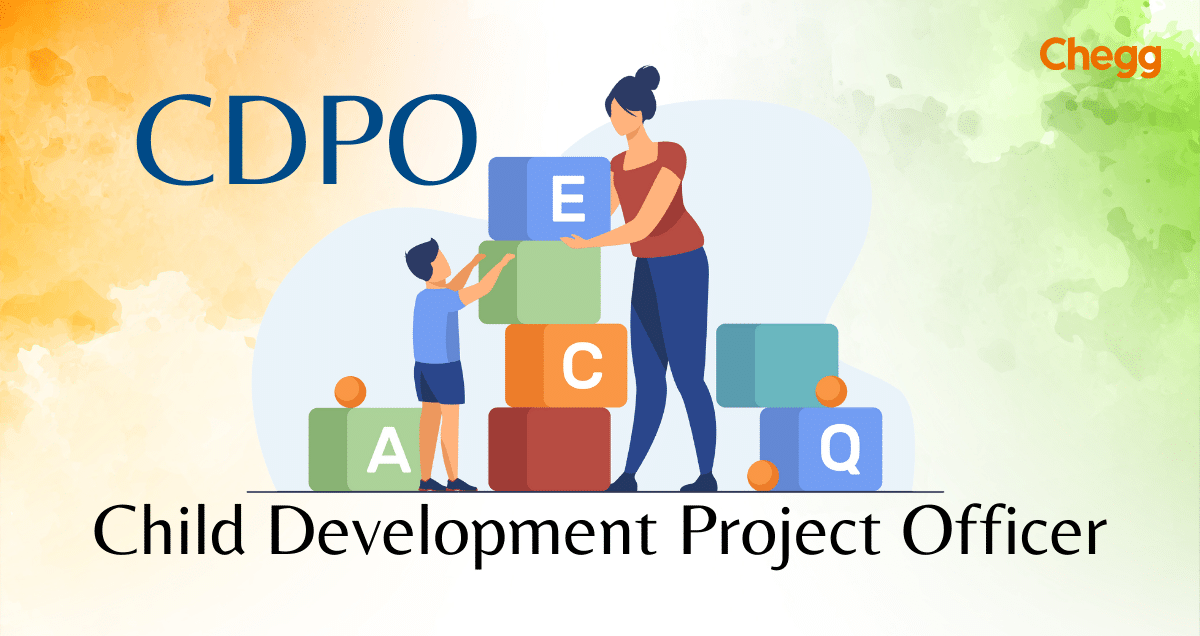Table of Contents
CDPO Full Form
CDPO full form stands for Child Development Project Officer. The key position of the CDPO comes under the District Level in the administrative hierarchy. The post of CDPO is within the Integrated Child Development Services.
The role of the Child Development Project Officer (CDPO full form) is to ensure that the proper implementation of development programs carried out by the government is appropriately executed to ensure the overall development of children. The role requires constant engagement with nonprofit organizations and government agencies working towards the holistic development of children. Understanding the “CDPO full form” is essential, as it highlights the importance of this position in coordinating efforts to improve child welfare and development. The CDPO plays a critical role in overseeing various initiatives aimed at enhancing the health, education, and well-being of children in the community.
Being a Child Development Project Officer (CDPO full form) means maintaining communication with the community and families to ensure that the policies outlined by the government are reaching the targeted section of society, specifically children, and fostering the change these policies aim to achieve. Understanding the “CDPO full form” is essential, as it emphasizes the significance of this role in the broader context of child development initiatives. Let’s learn more about the roles and responsibilities of the Child Development Project Officer, which include overseeing various programs, coordinating with stakeholders, and ensuring that the needs of children are met effectively within the community.
CDPO Full Form in Hindi
बाल विकास परियोजना अधिकारी (Baal Vikas Pariyojana Adhikari).
CDPO Meaning
CDPO means Child Development Project Officer (CDPO full form). The officer is responsible for organizing and administrating services and implementing ICDS at the field level. Integrated Child Development Scheme, or ICDS, is a government program in India. It provides the following benefits to mothers and children under six:
- Nutritional meals
- Preschool education
- Primary Healthcare
- Immunization
- Health check-up
- Referral services
The scheme was launched in 1975. A Child Development Project Officer plays a key function in ICDS. A CDPO officer works with children and families to promote children’s healthy development.
Being a CDPO means working with various governmental, nonprofit organizations, and private institutions to allocate resources efficiently and effectively. These resources will help in the overall development of children. Let’s learn more about the duties of CDPO.
Anganwadi CDPO
Child Development Project Officers (CDPO full form), are vital employees in charge of managing and supervising Anganwadi centers. These establishments are a component of an Indian government initiative to provide basic services like healthcare, education, and nutrition to impoverished children as well as expectant and nursing mothers.
Roles and Responsibilities of a CDPO
As the CDPO full form suggests, a child development project officer’s main duty is to ensure proper execution of the ICDS. However, here is the list of duties of a CDPO:
- Implementation of ICDS.
- Implementation of Supplementary Nutrition Program.
- Overall in charge of the CDPO office
- Coordination with all online departments at the block level.
- Recommendation of awards for Anganwadi workers and helpers.
- Creation and submission of proposals to the Directorate related to schemes, budget estimates, annual and five-year plans, etc.
Challenges Faced by CDPOs
As the CDPO full form suggests, CDPO means being a key post in the administrative hierarchy. The officer has to face challenges and hurdles that might hinder the smooth and effective implementation of welfare programs. A CDPO faces these issues:
- Delayed implementation of schemes due to bureaucratic complexities, excessive paperwork, and delayed approvals by the departments involved.
- Limited resources, shortage of equipment, and lack of proper infrastructure can also pose a challenge to meeting the objective of the schemes.
- The lack of cooperation by the families and village panchayats highlights many sociocultural barriers and beliefs that delay the right approach to implementing the schemes.
- The right way to communicate with the children’s families and understand the region’s geography before implementing any policies is important.
CDPO Eligibility & Skills

To become a Child Development Project Officer (CDPO full form), candidates typically need to meet specific educational and other qualifications. While these can vary slightly depending on the state or recruiting body, the general requirements include:
1. Educational Qualifications:
- Bachelor’s Degree: A candidate must hold a bachelor’s degree in a relevant field. Common acceptable fields of study include:
- Home Science
- Sociology
- Social Work
- Nutrition
- Child Development
- Psychology
- Anthropology
- Education
- Master’s Degree: Although not always mandatory, having a master’s degree in one of the relevant fields mentioned above can be advantageous and may be preferred by some recruiting bodies.
2. Age Limit:
The typical age range for candidates is usually between 21 to 35 years. However, there can be age relaxations for candidates belonging to reserved categories such as SC/ST/OBC as per government norms.
3. Experience:
While not always mandatory, prior experience in social work, child development, or related fields is often preferred. This can include work with government programs, NGOs, or other organizations focused on child welfare and development.
4. Selection Process:
- Written Examination: Many positions require candidates to pass a written examination that tests their knowledge in relevant subjects.
- For Child Development Project Officer eligibility, the first step is to crack the UPSC exam. It consists of two exams:
- Exam I – General Studies
- Exam II – Children’s Development
- For Child Development Project Officer eligibility, the first step is to crack the UPSC exam. It consists of two exams:
- Interview: After the written examination, candidates often go through an interview process to assess their suitability for the role. The questions will be related to your educational background, work experience, and skills related to child development.
- Document Verification: Final selection may involve verification of educational qualifications, experience certificates, and other necessary documents.
5. Additional Requirements:
- Language Proficiency: Proficiency in the local language may be required, especially for positions that involve direct interaction with the community.
- Computer Skills: Basic computer literacy is often necessary for maintaining records, preparing reports, and managing project-related data.
6. Skills and Competencies:
- Leadership and Management Skills: Ability to lead and manage projects, including team management and resource allocation.
- Communication Skills: Strong verbal and written communication skills to interact with various stakeholders, including children, parents, community members, and government officials.
- Analytical Skills: Ability to analyze data and reports to make informed decisions regarding child development projects.
- Problem-Solving Skills: Capability to address and resolve issues that may arise in the implementation of child development programs.
- Knowledge of Government Schemes and Policies: Familiarity with government programs and policies related to child development, nutrition, and welfare.
These qualifications ensure that a CDPO has the necessary knowledge, skills, and experience to effectively manage child development projects and contribute to the welfare of children in the community.
Salary of a (CDPO) in India
The salary of a Child Development Project Officer (CDPO full form) in India varies based on the state, pay scale, and other factors such as experience and location. Here’s a breakdown of the typical salary structure:
1. Basic Pay:
The basic pay for a CDPO generally ranges from INR 35,000 to INR 45,000 per month. This can vary slightly depending on the state government’s pay scale and policies.
2. Allowances:
- Dearness Allowance (DA): A percentage of the basic pay that is adjusted periodically to offset the impact of inflation.
- House Rent Allowance (HRA): This varies based on the city or town where the CDPO is posted. It can range from 8% to 24% of the basic pay depending on whether the posting is in a rural, semi-urban, or urban area.
- Travel Allowance (TA): Provided to cover travel expenses incurred during official duties.
3. Gross Salary:
When combining the basic pay and allowances, the gross monthly salary of a CDPO typically falls between INR 50,000 and INR 60,000. This can be higher with additional perks and benefits, depending on the specific state’s compensation structure.
4. Other Benefits:
- Medical Benefits: CDPOs often receive medical coverage for themselves and their families.
- Pension and Provident Fund: Contribution to pension and provident fund schemes as per government rules.
- Leave and Holidays: Entitlement to various types of leave such as casual leave, earned leave, and maternity/paternity leave.
- Other Perks: Depending on the state, CDPOs may also receive benefits such as gratuity, group insurance, and other post-retirement benefits.
By understanding the salary structure and the factors influencing it, aspirants can have a clear picture of the financial rewards that come with this vital position in public service.
CDPO: Impact on the Community and Society
A Child Development Project Officer (CDPO full form) has a huge impact on the community and society. Here’s how they make a difference:
Health and Nutrition
- CDPOs make sure kids get nutritious meals and educate parents on healthy eating. They tackle malnutrition head-on, ensuring children grow up healthy.
Education
- They oversee early learning centers (Anganwadis), where kids get their first taste of education, setting the stage for their future schooling.
Women Empowerment
- CDPOs help women learn new skills to find jobs or start businesses, boosting their confidence and independence, which benefits the whole community.
Community Engagement
- They bring the community together to discuss and address local needs, ensuring solutions are practical and effective.
Policy Implementation and Child Protection
- CDPOs ensure government programs reach those in need and protect kids from abuse and exploitation, setting up systems for their safety and well-being.
Economic Impact
- By improving kids’ health and education, they reduce family medical expenses and enhance future job opportunities for these children, strengthening the community’s economy.
Crisis Management
- In disasters, CDPOs coordinate relief efforts, making sure kids and families get quick help.
Real-life Example
- Imagine a CDPO noticed kids not attending school because parents didn’t see its value. She organized fun events to show the benefits of education, and soon more kids started going to school.
In essence, CDPOs help create healthier, better-educated communities and support the well-being of children and women.

The importance of CDPO
As a CDPO, you will be able to make a lot of children’s lives better. They will be able to get the help and direction they require from you to succeed in life. You will be in a position to assist parents in raising happy, healthy kids. You’ll be able to encourage development both inside and outside of your neighborhood. You’ll have the opportunity to make a meaningful and long-lasting impression on the world.
Future Perspectives and Emerging Trends in Child Development
The future of child development is brimming with exciting possibilities and evolving trends. Here are some key areas to consider for CDPO full form (Child Development Project Officer):
- Tech Integration: Technology will likely play a bigger role in early childhood education. This includes educational apps, interactive learning tools, and even virtual reality experiences. These tools can make learning fun and engaging, but traditional play and social interaction will still be important.
- Focus on SEL: Social-emotional learning (SEL) will become more important. Programs will help children develop skills like self-awareness, managing emotions, empathy, and building healthy relationships.
- Personalized Learning: Learning may become more personalized to fit each child’s needs and learning styles. Data and assessments could be used to create tailored programs and activities for each child.
- Increased Focus on Mental Health: There will be more awareness and support for mental health in early childhood. Early intervention can greatly improve a child’s long-term well-being.
- Globalized Education: As the world becomes more connected, teaching children about global citizenship and diverse cultures will become a bigger part of education programs.
- Nature Play: The benefits of playing in nature for children’s physical, cognitive, and social development will be more recognized. Programs might include more outdoor activities and nature-based learning experiences.
- Importance of Family Engagement: Working with families will remain crucial to child development. Programs will find new ways to support parents and caregivers in their roles.
These are some of the future trends in child development. As research and understanding of children’s needs grow, we can expect even more innovative ways to help young minds develop healthily and happily.
CDPO Full Form in Various Contexts
1. CDPO Full Form in Anganwadi:
Child Development Project Officer: In the context of Anganwadi services, a CDPO oversees the functioning of Anganwadi centers, ensuring the effective delivery of services like nutrition, health check-ups, and preschool education under the ICDS scheme.
2. CDPO Full Form in Police:
While CDPO primarily refers to Child Development Project Officer, there is no commonly recognized full form of CDPO specifically in police terminology. However, it’s important to distinguish this acronym as it is not typically associated with policing roles.
3. CDPO Full Form in Medical:
Chief District Public Health Officer: In some contexts, particularly within public health departments, CDPO might be used to refer to a senior public health official responsible for overseeing health programs at the district level.
4. CDPO Full Form in Education:
Child Development Project Officer: Within the education sector, CDPOs may focus on the developmental aspects of children in educational programs, ensuring holistic development through integrated schemes.
5. CDPO Full Form in Bihar:
Child Development Project Officer: In Bihar, as in other states, the CDPO plays a crucial role in implementing child development and welfare programs under the ICDS scheme. The qualifications and roles remain consistent with the general description provided.
Conclusion
Being a Child Development Project Officer (CDPO full form) means crucial responsibility and decision-making as it directly impacts the nourishment and growth of the children. A CDPO needs to plan and choose the best ways to implement the schemes and programs dedicated to children with the healthy cooperation of nonprofit organizations and other functionaries. A CDPO plays a crucial role in fulfilling the essential needs of children in their early stages of life.
Key Takeaway
- CDPO Full Form: Child Development Project Officer.
- Main Role: Implementing and monitoring child development programs.
- Work Scope: Focuses on health, nutrition, and education for children and mothers.
- Workplace: Integrated Child Development Services (ICDS).
- Qualifications: Degree in social work, sociology, or related fields; must pass specific exams.
- Impact: Ensures child well-being and development, crucial for social health.
- Career Growth: Leads to senior roles in child welfare, social services, health, and education sectors.
Learn about some other full form:
| PWD Full Form | CISF Full Form |
| UIDAI Full Form | FSSAI Full Form |
| LDC Full Form | DGP Full Form |
| IAS Full Form | MLA Full Form |
| EWS Full Form | TRAI Full Form |
Ready to learn more? Click here to get the complete list of Full Forms!
CDPO Full Form: FAQs
What is CDPO full form?
The CDPO full form is Children Development Project Officer.
What is the educational background required for the post of CDPO? Or What is the qualification of CDPO?
It is necessary to have a Bachelor’s degree in any one of the fields, Human psychology, sociology, or a degree in Child development.
What is the highest salary of CDPO? Or What is the salary of CDPO in India?
Child Development Project Officer (CDPO full form) salary in India ranges between ₹ 0.9 Lakhs to ₹ 12.0 Lakhs with an average annual salary of ₹ 6.0 Lakhs.
What are the skills required for a CDPO?
Apart from fulfillment of the eligibility criteria, cooperation with different functionaries, understanding the sociocultural aspect, and effective communication skills are the demands of the role of a CDPO.
What are the duties of a CDPO?
1. Proper implementation of the schemes carried out by the government, ensuring the overall coverage.
2. Evaluating the results derived from the program.
3. Communicating with nonprofit organizations and other functionaries to allocate resources.
What is the role of a CDPO officer?
1. Provide support to families and communities, also
2. Develop and monitor programs that promote the well-being of children.
Is CDPO a central government job?
No, CDPOs are recruited by State Governments/UT administrations.
Who is eligible for BPSC CDPO?
Education: A Bachelor’s degree from a UGC recognized university in any discipline.
Age: Minimum age of 21 years. The upper age limit is 37 years for males and 40 years for females (relaxations applicable for reserved categories).
What is the last date for CDPO 2024?
The deadline for applications is May 20, 2024, and candidates can have their payments deducted until May 21, 2024.
Got a question on this topic?
